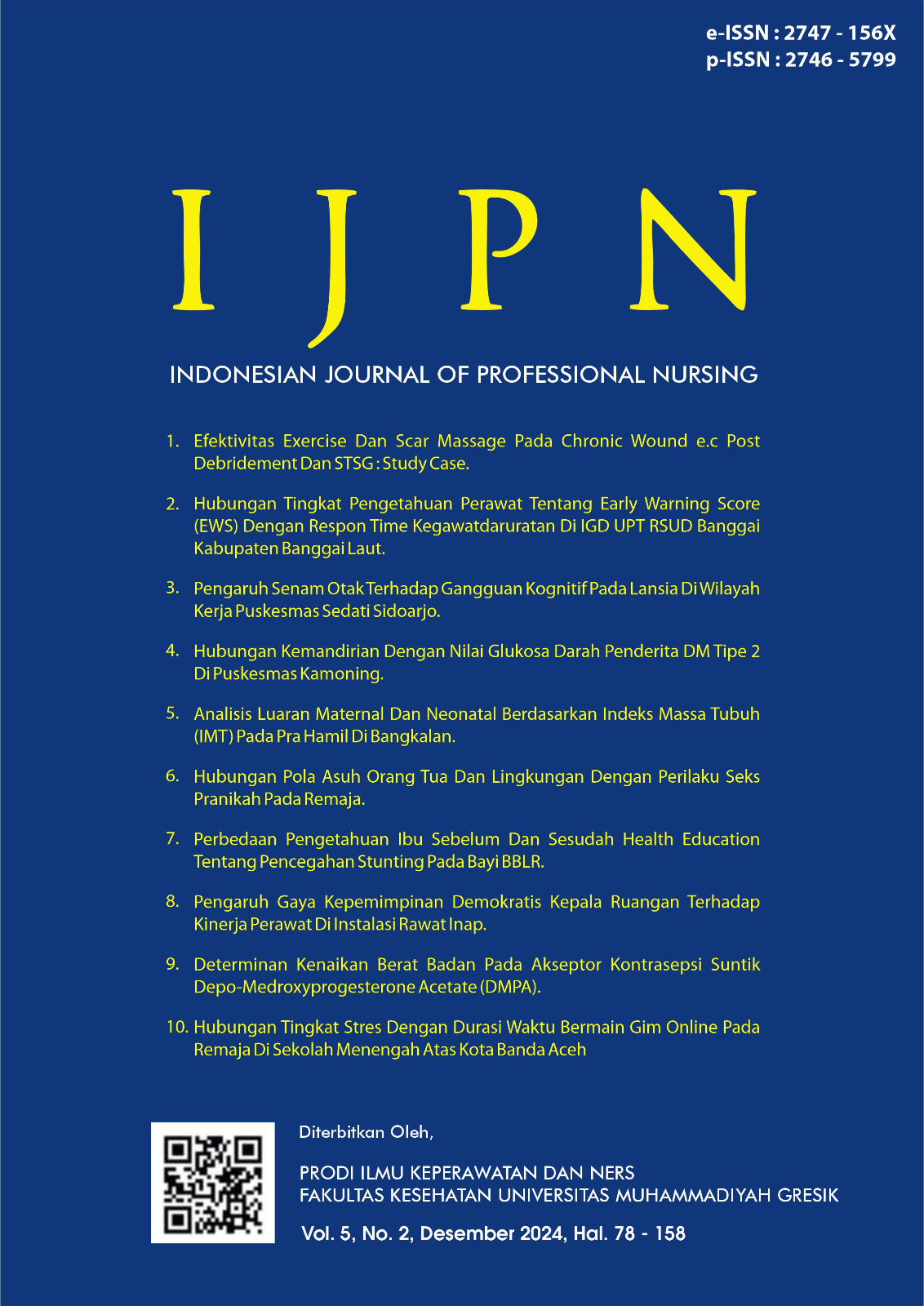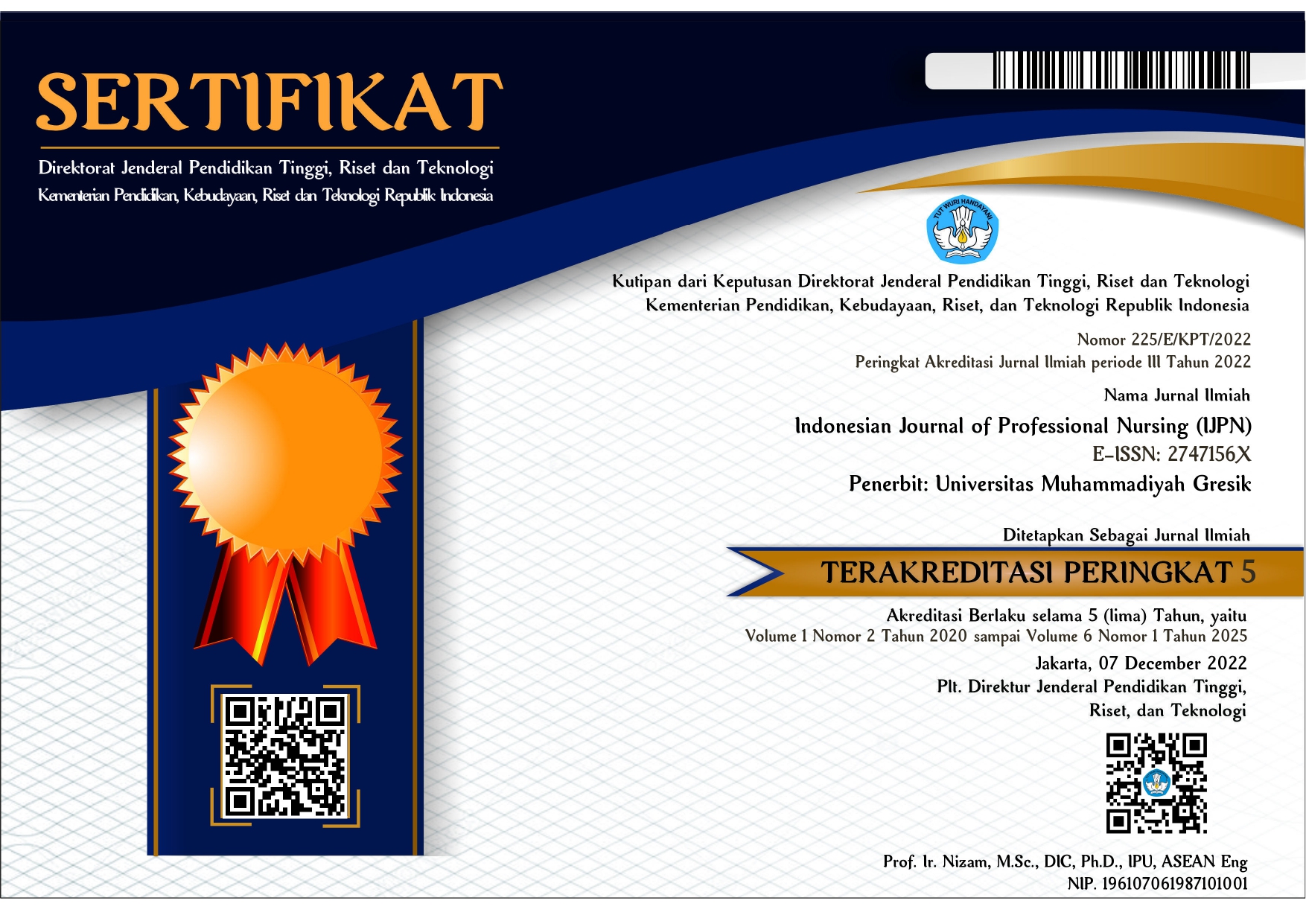Hubungan Kemandirian Dengan Nilai Glukosa Darah Penderita DM Tipe 2 Di Puskesmas Kamoning
DOI:
https://doi.org/10.30587/ijpn.v5i2.8705Keywords:
diabetes melltus self-care, blood glucoseAbstract
Diabetes mellitus is a disease characterized by increased blood glucose levels, which can cause various complications, including damage to blood vessels, heart, kidneys, and increase the risk of stroke and death. Type 2 diabetes mellitus is caused by insulin retention in muscle and liver cells, which ultimately interferes with the ability of pancreatic beta cells to produce insulin, so that glucose cannot enter the body's cells.
The purpose of this study was to analyze the relationship between independence and blood glucose values in patients with type 2 diabetes mellitus in the Kamoning Health Center work area. The design of this study was a quantitative cross-sectional approach with a population of all type 2 diabetes mellitus patients at the Kamoning Health Center of 55 people. Samples were taken using a purposive sampling technique, with a total of 48 patients.
The instruments used were the Summary of Diabetes Self-Care Activities (SDSCA) questionnaire and the Easy Touch GCU blood glucose measuring device. The results showed that out of 48 respondents, 20 patients (41.7%) had controlled glucose values with good self-care, while 1 patient (2.1%) had controlled glucose values with poor self-care. On the other hand, 15 patients (31.2%) had uncontrolled glucose levels despite good self-care, and 12 patients (25%) had uncontrolled glucose levels with poor self-care. The Chi Square test showed a p value = 0.006, indicating a relationship between independence and blood glucose values. The conclusion of this study is that there is a relationship between independence and blood glucose values in patients with type 2 diabetes mellitus. Good self-care behavior and routine monitoring of blood glucose values are very important to control glucose values and prevent further complications.
References
Agustina, V., Astuti, N. P., & Naranti, H. F. (2022). Hubungan Self Care Activities Terhadap Nilai Glukosa Darah puasa pasien Diabetes Melitus Tipe 2 di RSUD Kelet Provinsi Jawa Tengah. JPP (Jurnal Kesehatan Poltekkes Palembang), 17(2), 207-214.
Basir, I. S., Paramatha, N. R., & Agustin, F. D. (2022). Self care pasien diabetes melitus. Jurnal Penelitian Perawat Profesional, 4(2), 691-698.
Bumi Medika Tim. 2017. Berdamai dengan Diabetes.Bumi Medika. Jakarta.
Chandra., L.J. 2021. Hubungan Tingkat Depresi dengan Activity Daily Of Living Pada Pasien DM Tipe 2 di Rumah Sakit Cibitung Medika. Skripsi Tidak Dipublikasikan. Program Studi Ilmu Keperawatan (S1) dan Pendidikan Profesi Ners Sekolah Tinggi Ilmu Kesehatan Medistra Indonesia Bekasi.
Chayati, N., dkk. 2021. Perawatan Pasien dengan Pendekatan Teori-Teori Keperawatan. CV. Bintang Semesta Media. Yogyakarta
Istibsaroh, F., Amilia, Y., Arif, A. Z., Sukartini, T., & Nadatien, I. (2021).Pengaruh Bimbingan Berpusat Pada Klien Terhadap Kemandirian Pasien Diabetes Mellitus Tipe 2. Jurnal Keperawatan Muhammadiyah, 6(2).
Istibsaroh, F., Mila, F., Arif, A. Z., & Widyyati, M. L. I. (2023). Aktivitas Fisik Jalan Santai Untuk Penanganan Ketidakstabilan Nilai Glukosa Darah Pada Pasien Diabetes Mellitus. Indonesian Health Science Journal, 3(1).
Istibsaroh, F., Arif, A. Z., Hasanah, N., & Dewi, W. H. (2024). Penurunan Nilai Glukosa Darah Pada Pasien Diabetes Mellitus Tipe 2 Melalui Sekawat Biqul (Senam Kaki Dengan Sholawat Thibbil Qulub) Di Wilayah Kerja Puskesmas Kamoning Sampang. Jurnal Keperawatan Muhammadiyah, 9(1), 58-63.
Muchtar, R. S. U., Natalia, S., & Minanda, W. (2023). Hubungan Perilaku Self Management Dengan Nilai Gula Darah Pada Pasien Diabetes Melitus Tipe II Di Puskesmas Sekupang Kota Batam. Jurnal Medika Husada, 3(2), 67-76.
Muflihatin, S. K., Astuti, Z., Milkhatun, M., Halimah, N., & Nugroho, P. S. (2024). Hubungan Perawatan Diri (Self Care) dengan Nilai Gula Darah pada Penderita Diabetes Melitus Tipe 2. Jurnal Ilmiah Kesehatan Masyarakat: Media Komunikasi Komunitas Kesehatan Masyarakat, 16(1), 1-6.
Nuraini, N., Kep, M., Azizah, L. N., Ners, M. K., Ners, S. S., Sesaria, T. G., ... & Azhar, N. B. (2023). Asuhan Keperawatan Pada Pasien Gangguan Sistem Endokrin.
Nursalam. (2020). Metodologi Penelitian Ilmu Keperawatan (P. P. Lestari (ed.); Edisi 5). Salemba Medika.
Priyanto, A., & Juwariah, T. (2021). Hubungan Self Care Dengan Kestabilan Gula Darah Pasien Diabetes Mellitus Type II. Jurnal Ilmu Kesehatan Vol, 10(1).
Rakhmat, A. (2021). Gambaran Self care Pada Pasien Diabetes Melitus Tipe Ii Di RSUD Labuang Baji Makassar. JIMPK: Jurnal Ilmiah Mahasiswa & Penelitian Keperawatan, 1(1), 13-18.
Rahman, Z., Pujiati, W., & Saribu, H. J. D. (2023). Self Care Berhubungan dengan Nilai Gula Darah Pasien Diabetes Melitus Tipe 2. Jurnal Keperawatan Silampari, 6(2), 1336-1344.
Rismayanti, D.A. 2022. Hubungan Antara Self Efficacy dengan Kemampuan Perawatan Diri (Self Care). Skripsi Tidak Dipublikasikan. Program Studi Keperawatan, Bisnis dan Teknologi Universitas Widya Husada Semarang.
Kristelina, J., Zainal, S., & Fajriansi, A. (2023). Pengaruh Self Care Activity Dalam Mengontrol Gula Darah Pada Penderita Diabetes Melitus Tipe 2 Di Puskesmas Tamalanrea Jaya Kota Makassar. JIMPK: Jurnal Ilmiah Mahasiswa & Penelitian Keperawatan, 3(3), 136-142.
Paisal, A., (2021). Gambaran Self Care pada penderita diabetes melitus menurut teori Orem diwilayan kerja puskesmas Batunadua, Skripsi tidak dipublikasikan. Program Studi Keperawatan Program Sarjana Fakultas Kesehatan Universitas Aufa Royhan dikota Padangsimpuan.
Putri, L.R. (2017). Gambaran Self Care Penderita Diabetes Melitus (DM) di Wilayah kerja Puskesmas Srondol, Skripsi tidak dipublikasikan. Departemen Keperawatan Fakultas Kedokteran Universitas Diponegoro Semarang.
Safruddin, S., & Yuliati, Y. (2022). Analisis Self Care Behavior Terhadap Nilai Gula Darah Pasien Diabetes Melitus Di Puskesmas Antang Kota Makassar. Jurnal Ilm Kesehat Pencerah, 11(1), 10-24.
Triyono, E.A. 2023. Profil Kesehatan Provinsi Jawa Timur Tahun 2022.
Dinas Kesehatan Provinsi Jawa Timur 2023. Surabaya.
Yahya, N. 2018. Hidup Sehat dengan Diabetes. Tiga Serangkai. Solo.
Yusnita, Y., & Tuharea, R. (2021). Pengaruh Self Manajement terhadap Pengendalian Nilai Gula Darah pada Penderita Diabetes Mellitus Tipe II di UPTD Diabetes Center Kota Ternate. Media Publikasi Promosi Kesehatan Indonesia (MPPKI), 4(3), 383-391










